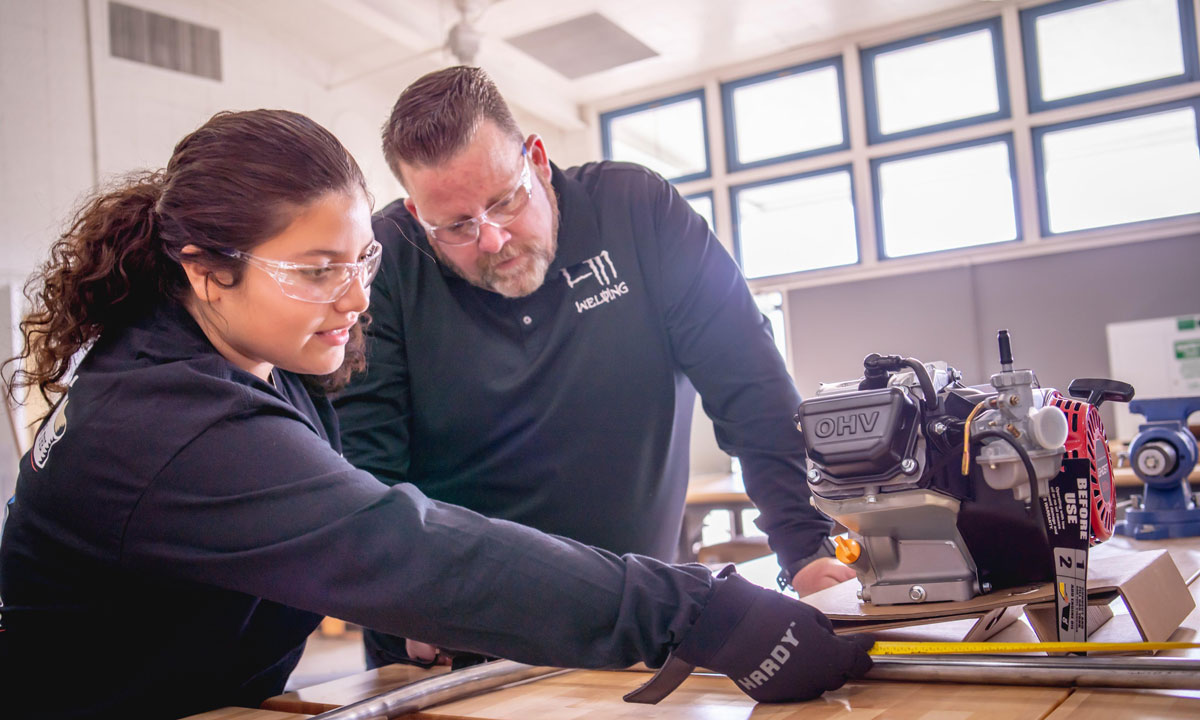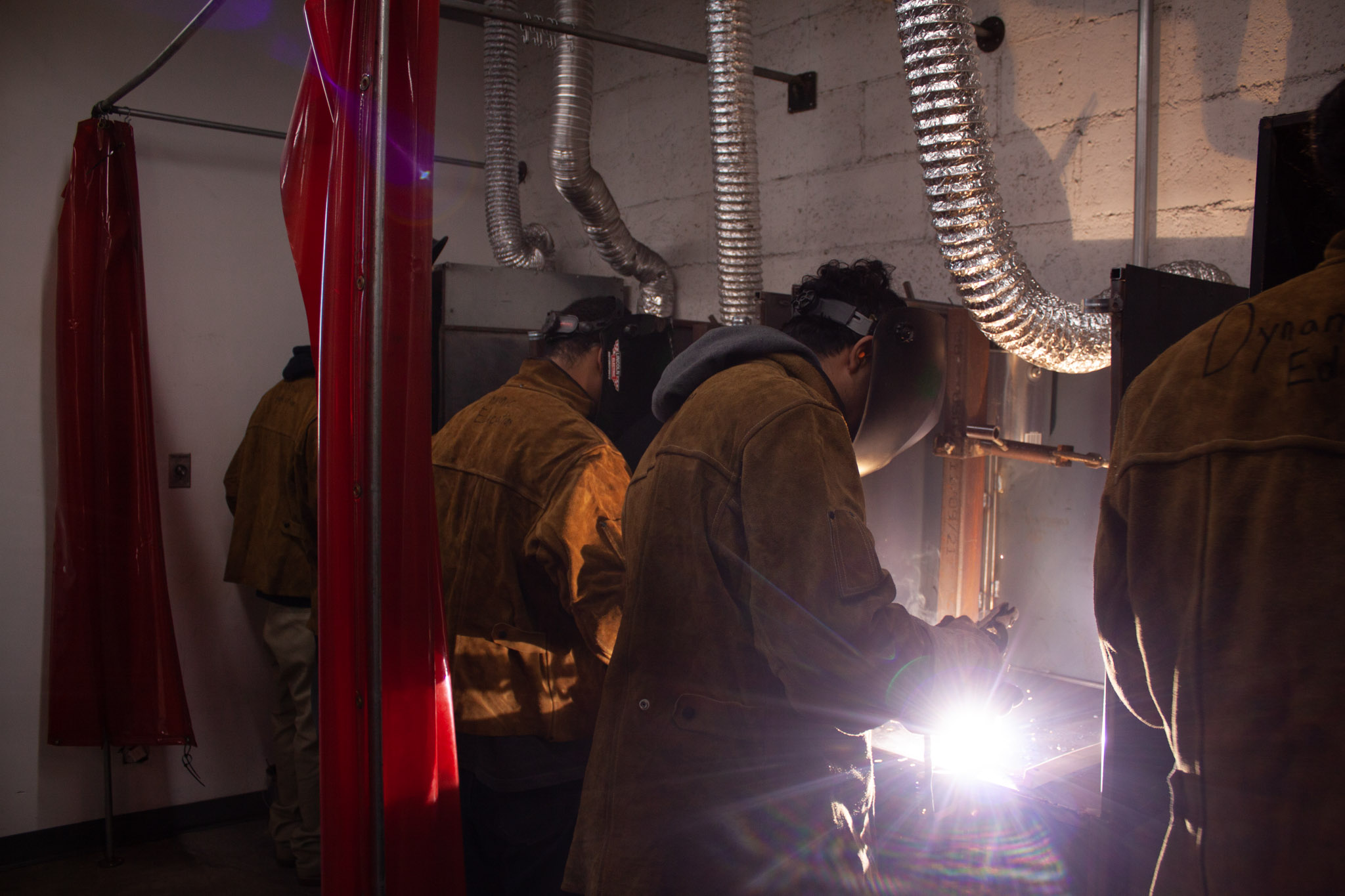New Poll Finds Overwhelming Support for More Trade Classes in L.A. High Schools
Survey of Los Angeles voters, parents and students finds that more than 80% support increased funding for schools to offer vocational courses.

Get stories like this delivered straight to your inbox. Sign up for The 74 Newsletter
A new survey of Los Angeles County voters, parents and students finds strong support for the expansion of skilled trades education in Los Angeles public high schools. More than 80% of those surveyed believe trade classes can better prepare students for a career, and the majority think it can be valuable for both college- and non-college-bound high schoolers.
The survey polled more than 1,000 registered voters, parents of public high school students in L.A. County and students. It intentionally focused on parents and students from “backgrounds disproportionately impacted by inequities in our education system,” particularly those who are Black, Latino and immigrants. There were also four focus groups, two with students and two with parents.The poll was commissioned by Harbor Freight Tools for Schools, a program created by the founder of Harbor Freight Tools to expand skilled trades classes in high schools across the country.
L.A. County is the most populous in the nation, yet fewer than 1 in 5 public high schools in its 80 school districts offer trade programs and classes. Over the last 25 to 30 years, skilled trades classes in high schools have vanished, and the few that remain are seen as important only for students not planning to attend college. Yet, among respondents who overwhelmingly support the expansion and funding of these classes, over 70% believe they can help students prepare for higher education.
“Incorporating skilled trades into high school curriculums is our ‘north star’ goal,” says Belen Vargas, senior director of Los Angeles County Programs at Harbor Freight Tools for Schools. The L.A. County program provides funding to schools that offer trades classes, like La Mirada High School and Port of Los Angeles High School, and supports mobile programs that do not require a dedicated classroom or on-campus equipment, including afterschool, on weekends and during the summer. The organization advocates for industry, labor and education leaders to support and fund the expansion of these classes in L.A.
Vargas says that what stood out to her in the focus groups was students’ recognition of the importance of construction jobs for their local economy and neighborhoods.
“Young people in the focus group really spoke about wanting to work in a career where it’s improving their community, and they spoke very eloquently about driving around and seeing these big projects going up and how they know that’s that’s to better their community, and they want to be part of that,” Vargas says.
She says the organization team met with over 20 big industry leaders last year. They unanimously agreed that these classes are important but said there is no existing pipeline of skilled professionals ready to take on the dozens of infrastructure projects that will be coming to L.A.
Brent Tuttle, a welding teacher at La Mirada High School, says there’s already a shortage of construction workers, but even more will be needed soon as L.A. prepares to host the Olympics in 2028.
“There’s welding, plumbing and all these trades out there that are in high demand … but nobody’s filling them because nobody’s trained to do it,” Tuttle says.
He has been teaching welding for 24 years, 14 of them at La Mirada. In 2020, Tuttle was one of 18 trade teachers who received $50,000 from Harbor Freight Tools for Schools.
He says there’s often a stigma attached to taking trade classes because people believe those students are less competent than those attending college and couldn’t get in. Yet he believes that perception is changing slowly as parents and students learn about the high wages many trade professions offer and as more people realize the skill and intellect needed for jobs such as auto mechanic. He says students who learn these skills in high school could be making six figures in five years, whereas those who attend college could graduate with hundreds of thousands of dollars of debt and earn far less.
He says that some of his students who went to college found that working in a trade was a better option.
“I didn’t think they were going to be welders, that wasn’t in their plan, but many went to school and they’re like, ‘You know what? This is tougher than I thought. I have this skill and now I’m falling back,’” he says.
Tuttle, who has about 150 students, models his class like a real welding job. His students in advanced classes are expected to arrive an hour and a half before school starts because that is typically when welding jobs begin. They are expected to come in, get dressed and begin working on projects for the first two hours of class. His freshmen and sophomores learn how to use the machinery and learn the basics of five types of welding.

Jacob Pittman, a senior, has already completed all his graduation requirements, so he spends four class periods in the welding workshop and has become a shop lead, helping his classmates. Like many students, Pittman had a difficult time adjusting when the pandemic began, and his grades suffered. Early into high school, he decided college wasn’t for him. His dad was supportive of his decision and introduced him to the option of trade school. Tuttle says Pittman has been a standout student because of his strong work ethic and how quickly he picks up on skills. Tuttle has received approval from the school to hire a shop aide and says he plans to hold off on filling the position while Pittman attends trade school for a year. After that, he intends to hire him.
Pittman says his favorite part of the welding program is the positive environment where everyone seems to genuinely enjoy their time working on their craft and creating projects.
Like Pittman, 17-year-old Nova Thomas enjoys helping younger students. She recalls the summer program where they helped middle school students build barbecue grills as one of her favorite projects. Tuttle says the summer program La Mirada does through Harbor Freight Tools for Schools has allowed more girls to participate. Thomas says she tries to promote the welding program to the middle school girls because of her great experience.
“I’ve definitely always felt comfortable and never felt inferior in the shop,” she says. “It’s always been a safe space, and I’ve never felt like I had to compete for anybody’s respect, so I always appreciate that. During the summer school program, I tried to stress to the girls how important and awesome it would be if they would actually continue with these skilled trades later on.”
Tuttle says his female students typically end up being better welders than his male students because they are more meticulous. He says that though they are usually slower than the male students, it’s because they are focusing on perfecting every level.
“I’m super lucky to have the shop I have,” Tuttle says. “I know I’m in a blessed situation where my boss has yet to tell me ‘no’ on things that I’ve asked, as long as it’s within reason.”
He believes the county isn’t doing a good job of giving students options while they’re in high school to pursue these careers.
The survey, conducted by research firm Evitarus, polled 400 registered voters, 495 parents of students attending public high schools in L.A. County and 258 students. Evaritus conducted three online surveys between Nov. 20, 2023, and Jan. 21, 2024. The margin of error for registered L.A. voters was plus or minus 4.9%. The four focus groups were for South L.A. Black/African American parents; L.A. Harbor Latino high school students; L.A.Harbor Latino parents (in Spanish); and South L.A. Black/African American high school students.
Get stories like these delivered straight to your inbox. Sign up for The 74 Newsletter

;)
